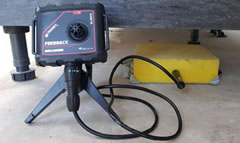Determining the moisture content of a new concrete floor or screed is essential before proceeding to lay new floor coverings. Concrete and screeds are generally wet materials when placed and whilst some of their water content will be taken up during the initial hydration process, a large proportion of the materials original water content will remain only to evaporate over time as the floor or screed naturally cures.
 A typical concrete floor can retain between a quarter to a third of its original water content after hydration, which could be as much as 40 - 60 litres per m³. It is this residual moisture which remains after initial hydration that needs to evaporate before the floor can be considered dry and safe to receive new floor coverings. The ability of concrete to release this free moisture during the drying phase depends upon several factors, which can mean that concrete floors and screeds can take many weeks if not months to dry sufficiently.
A typical concrete floor can retain between a quarter to a third of its original water content after hydration, which could be as much as 40 - 60 litres per m³. It is this residual moisture which remains after initial hydration that needs to evaporate before the floor can be considered dry and safe to receive new floor coverings. The ability of concrete to release this free moisture during the drying phase depends upon several factors, which can mean that concrete floors and screeds can take many weeks if not months to dry sufficiently.
Failing to determine the moisture content of the concrete or screed can lead to swelling, cupping and delamination of almost any surface floor covering. Problems with mould growth, damp and decay may also occur to other closely related building materials such as: adjacent walls, plaster and joinery. It is therefore essential your new concrete floor or screed is certified dry before installing the final floor finish.
We're specialists in the moisture content analysis of concrete floors and screeds. If you're involved in new construction or simply the renovation of old, we can assist with testing and monitoring of new floors and screeds, ensuring they achieve your desired moisture level before you proceed with new coverings or further works.
Dryfix use a variety of different methods to test both concrete and screed materials for moisture, some intrusive and some non-intrusive and all in accordance with British Standards and Codes of Practice.
All of the above test methods have their own advantages and disadvantages as they determine the moisture content of the floor differently. We will however advise on which method is best suited in your scenario.
So, what happens if your floor isn't dry? Don't worry, Dryfix are specialists in accelerated drying of buildings, therefore if you are restricted by timescales, have suffered with an escape of water or are struggling to adhere to best practice drying conditions, we can assist and encourage drying in a safe and controlled manner using our specialist drying systems.
If you suspect a problem and require a survey, or want to find out more about our chemical free damp proofing systems, please contact us.